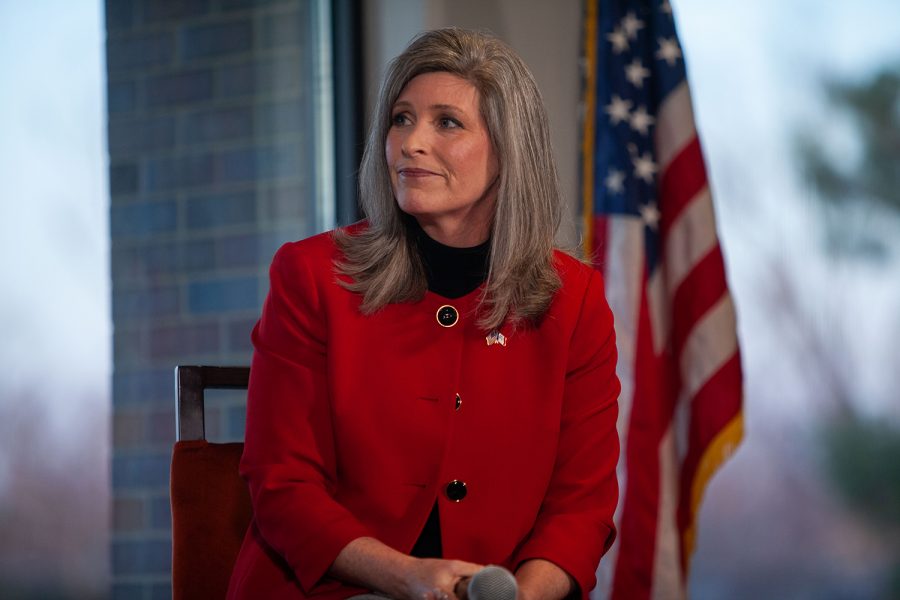Opinion | Ernst’s newest beef with Biden
The Iowa senator is intent on waging a non-existent war against the federal government’s tepid attempts to reduce meat eating.
U.S. Sen. Joni Ernst (R-Iowa) speaks to a crowd on Thursday, April 1 at an Iowa GOP regional reception in Cedar Rapids at the Elmcrest Country Club.
April 29, 2021
To those concerned: the liberal agenda is not coming for your burgers.
Earlier this month, Sen. Joni Ernst published a column decrying the “war on meat.” Pushing back against the perceived liberal agenda of taking our meat, Ernst has proposed The TASTEE act that prohibits federal agencies from establishing policies that banned serving agricultural products for employees. Alongside a host of other claims from Fox News and other right wing outlets, it appears not even meat is safe from the culture war anymore.
The meatless Monday Ernst is so afraid of comes from a newsletter in 2012 in the Department of Agriculture, which made a dietary suggestion to employees to ensure that they had a healthy diet. There was no ban in any cafeterias or other federal agencies restricting the access to meat.
The next big scare is Rep. Alexandria Ocasio-Cortez’s Green New Deal. It is a non-binding resolution sponsored by herself and Ed Markey, which is to say, it means nothing. It’s a stated set of potential goals and ideas, none of which have anything to do with banning meat.
The only thing related to meat and farming in the Green New Deal is the following:
(G) working collaboratively with farmers and ranchers in the United States to remove pollution and greenhouse gas emissions from the agricultural sector as much as is technologically feasible, including —
(i) by supporting family farming;
(ii) by investing in sustainable farming and land use practices that increase soil health; and
(iii) by building a more sustainable food system that ensures universal access to healthy food;
And lastly, Biden’s own climate plan – which, surprisingly, says absolutely nothing about farming whatsoever. According to the Washington Post, the stated goal of cutting U.S. carbon emissions by half by 2030 was speculated, by one article, to be in large part by restricting animal agriculture.
So, what’s all the concern about? Why the needless fear mongering over absolutely nothing?
It’s simple — Ernst and other Republicans want there to be some sort of populist reaction against anything that vaguely resembles legislation to cut carbon emissions in the future.
Even though Fox News has made a retraction of its claims of the Biden burger ban, fear of it has already spread across the nation.
That fear is going to be used to rally conservatives against anything that could threaten the business interests of our biggest polluters. According to them, all Americans love a good burger, and the Democrats want to take your meat.
It doesn’t matter that the richest 10 percent of Americans account for 50 percent of emissions — so no, we’re all in this together.
Legislation that would make the people who are responsible for the oncoming climate catastrophe to ensure that we have a somewhat habitable world in 50 years is actually just a smokescreen to make us all meatless vegan puppets of the deep state.
The truth of the matter is that factory and animal farming does account for a significant amount of greenhouse gas emissions in the U.S., and we will need to figure out ways to curtail those emissions. But it does not start and end with stealing burgers from supermarkets and calling it a day.
The answer to this question is a lot more nuanced and complex, and it’s going to have to be figured out in policy far more specific than I can describe.
But that hurts business interests.
What Ernst wants to do is conflate necessary action with needless, random progressive actions that hurt people. But you will always be able to sink your teeth into a burger on American soil — no one is taking that away from you.
Columns reflect the opinions of the authors and are not necessarily those of the Editorial Board, The Daily Iowan, or other organizations in which the author may be involved.



